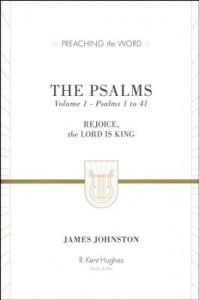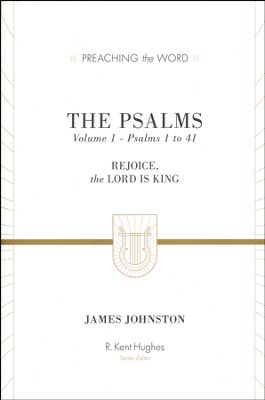⏱️ Estimated Reading Time: 5 min read
 The Psalms have long been a favorite portion of God’s Words. They form the basis for many songs we sing in worship and they are a definite source of hope, comfort, and inspiration when the good and bad situations of life come our way. The Psalms offer to the believer far more than just words to be put to song or a pick me up when you are feeling down. Throughout the Psalms, we see the picture of God as King. James Johnston, in his commentary on Psalms 1-41 rightly subtitled Rejoice, the Lord is King, focuses his salient exegesis on this important element of the first portion of the Psalms.
The Psalms have long been a favorite portion of God’s Words. They form the basis for many songs we sing in worship and they are a definite source of hope, comfort, and inspiration when the good and bad situations of life come our way. The Psalms offer to the believer far more than just words to be put to song or a pick me up when you are feeling down. Throughout the Psalms, we see the picture of God as King. James Johnston, in his commentary on Psalms 1-41 rightly subtitled Rejoice, the Lord is King, focuses his salient exegesis on this important element of the first portion of the Psalms.
This commentary is part of the highly readable and accessible Preaching the Word series. Intended as a tool for pastors to be better equipped to take the truth of Scripture and to share those truths with their congregations, this particular commentary series is focused not on examining every nuance of language or culture (although such things are noted), but rather on looking at the meat of a passage so that biblical sustenance can be provided to God’s people. Johnston’s contribution to this series is no different.
Johnston begins this commentary with some needed background information on the Psalms to include its overall composition, genre, its place in the Torah (an important point to make), the fact the Psalms is the Old Testament book most often quoted in the New Testament (an interesting bit of trivia), and the reality they are a collection of Psalms that forms a book, one that points to the Messiah, a book that tells a story of God’s dealings with His people and His sovereignty in carrying out His divine plan.
Building on that all important foundation, Johnston then proceeds to walk the reader through the first forty-one Psalms. I found the exegesis of the Psalms to be pointed, focused, and quite helpful. I have a large number of commentaries in my library on the Psalms as a result of taking a course on the Psalms in Seminary. Many of those commentaries seem to be bogged down in the theological, linguistic, and cultural minutia of the text. While such things are important to a large degree, there is a need for a commentary that takes an in-depth look at the text without swimming too far and too often into the deep end of the theological pool. Johnston’s commentary does wade into the deep end when needed, yet spends most of its time providing sound practical application of the text, something sorely needed in the world of commentaries.
Each Psalm in this commentary is examined in great detail, noting the background/historical items of interest that led to the writing of that particular Psalm. Johnston then concludes his discussion of that particular Psalm with come closing comments, encapsulating in a paragraph or two the “so what” of the discussion points. Interspersed in his commentary are personal examples and relevant stories that demonstrate using everyday examples the truths demonstrated in the text.
For instance, in his examination of the most famous Psalm of them all, that of Psalm 23, Johnston walks the reader through the reality that as King of Israel, David was to be the shepherd of his people. Even then, “David is also a sheep – the Lord is his Shepherd. A greater Shepherd cares for him.” Taking that truth, Johnston then aptly notes how this idea of a great Shepherd for God’s people is beautifully and notably revealed in the life of Christ. Johnston comments, “Like David, Christ was both a sheep and a shepherd. As the Lamb of God, Christ trusted his Father with his life.” He goes on to also correctly note, “Christ is not only a sheep, he is also our Shepherd. God took on flesh to become a Lamb to save us and a King to rule over us.” This has a daily application for us as believers, something Johnston also ensures the reader clearly understands. As our Great Shepherd, “He guards and guides us through this life”, even as we maneuver through those rocky and dark places, God is always with us.
It is this high quality and useful exegesis and application that gives me no qualms about highly recommending this commentary. Those who love the Psalms will find this commentary to be a treasure trove of sound biblical information on this beloved book of the Bible. This is a tool both pastors and laymen will be able to use in their daily Bible study, in particular when they are spending time discovering or perhaps re-discovering Psalms 1-41. I look forward to the other volumes in the Psalms commentaries in the Preaching the Word series.
This book is available for purchase from Crossway Books by clicking here.
I received this book for free from Crossway Books for this review. I was not required to write a positive review. The opinions I have expressed are my own. I am disclosing this in accordance with the Federal Trade Commission’s 16 CFR, Part 255 : “Guides Concerning the Use of Endorsements and Testimonials in Advertising.”




